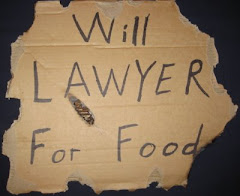Lately (and I will not support that statement with links or evidence), there seems to be much ado about homeowners, foreclosures, and what we can do to prevent these two things from coming together. From Obama's loan modification plan to Chapter 13 bankruptcies, there seems to be a glut of people trying to save their homes.
From my position, I can't help but wonder why. During the last ten years or so, with the real estate and lending markets going completely bonkers, there have been literally millions of bad loans written - loans were there was insufficient equity in the property to secure the loan, where the debtors had insufficient income to support the loan, and loans were every bit of information on the loan was false, fraudulent, or misrepresented. The real estate agents, brokers, lenders, and everyone in between was complacent if not fully complicit in writing and securing these "toxic" mortgages. (Update: 1 in 4 mortgages are underwater!)
And now those seeds have come to bear fruit. Almost every mortgage and almost all the real property I see coming through my office is a negative equity situation. Basically, any property purchased in the last 5 years is going to be underwater - that is, the balanced owed is more than the sale value of the property today.
The issue is simple - people are chasing smoke, in situations where they will not have home equity for a decade or longer. A decade of interest payments, and of principal payments that aren't building equity.
The solution is even simpler - foreclosure. Oh, but what a bitter pill! Let it go to foreclosure, then on the oft and rare chance the bank decides to bring a deficiency action, obtain good legal counsel or file for bankruptcy. Dump the McMansion with the negative amortization loan and rent a nice apartment for half or two-thirds the cost. Save that money - the money that would go to rent for the twelve months or longer that it would take to foreclose, and the difference of your eventual rent cost against your previous mortgage - save that money, and in a few years, you'll have $25k to $50k for a nice, safe, traditional mortgage.
The plus side - and there is one - is that you'll get to stick it to the man. I'm a fan of capitalism; I find no evil in making money. However, our current hybrid capitalism/socialism system, where profits are privatized and losses are subsidized, serves to line the pockets of those who don't deserve it while penalizing everyone else. For capitalism to work, there needs to be consequences. You write a bad loan, you take the loss - the necessary corollary to the idea that if you write a good loan, you take the profits. Instead, our current state lets the government (i.e., the taxpayer) take the loss instead. Heads they win, tails we lose.
The reality of this situation is that, if you are going through foreclosure, you cannot afford your home. Your $2,000 mortgage payment on your $3,000 monthly take-home income is unfeasible and unsustainable, and will continue to be for the foreseeable future. It is time to stop subsidizing these bad loans and losses, and let these folks reap what they have sown.
Bankrupt means having insufficient funds to pay your creditors - being insolvent. The number of people who file bankruptcy is but a small portion of the people who are actually bankruptcy. What we, as a society and as an economic system, need is more bankruptcies. More bankruptcies equal more losses and a greater deterrent to writing bad loans. Nobody - and I don't care if you're Bill Gates - needs a $50,000 credit limit.
The credit system - from mortgages to car loans to credit cards - is fundamentally flawed; the foundation is rotten. Financially, the system needs to be leveled to the bedrock and rebuilt, into a system that rewards those who manage their money wisely and punishes those who wield it recklessly.
Reflections
9 months ago
.jpg)


